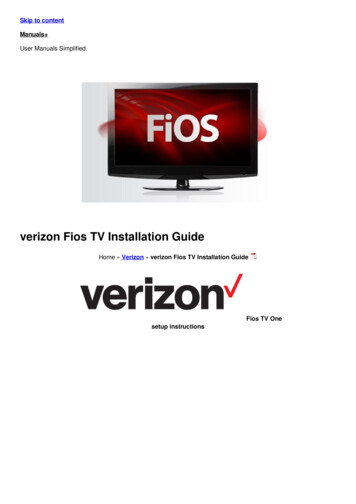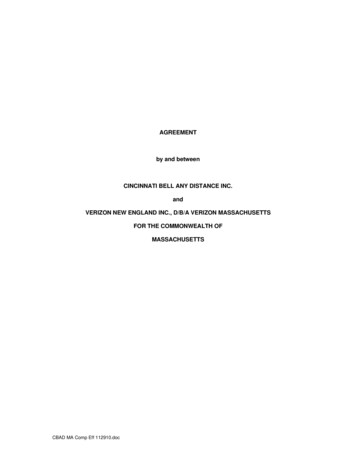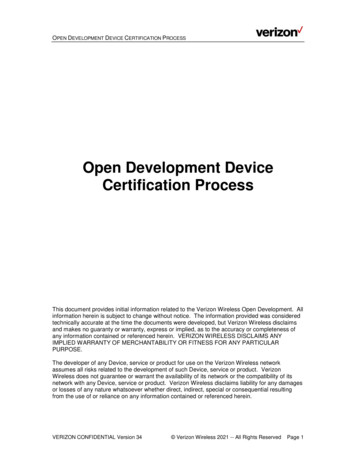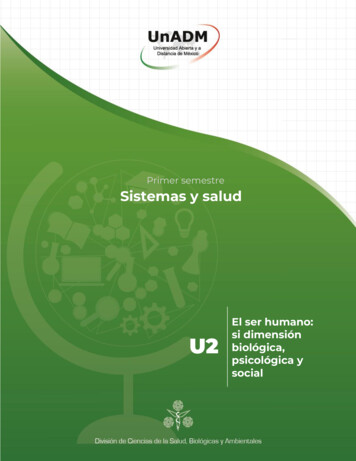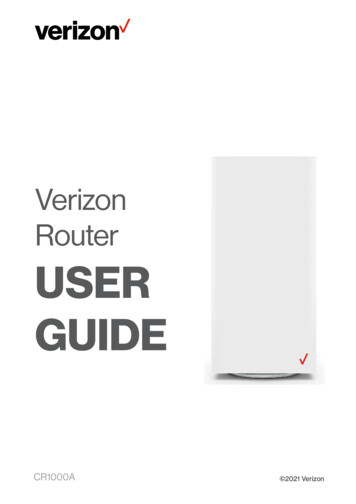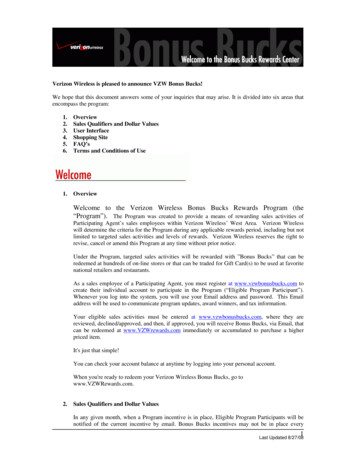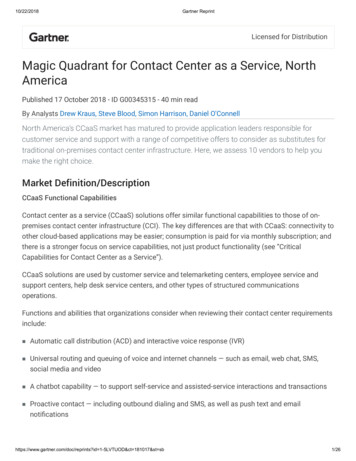
Transcription
STATE OF WEST VIRGINIAAt a regular term of the Supreme Court of Appeals, continued and held at Charleston,Kanawha County, on January 31, 2013, the following order was made and entered:State of West Virginia ex rel. Verizon West Virginia, Inc.,Andrea L. Custis, Victoria L. Boston, Robert Anderson,Judy Isner, Mary Frederick, Dawn Watson, BarbaraTerwilliger, and Jodi Dennis, Petitionersvs.) No. 12-1209Honorable James A. Matish, Judge of the Circuit Court ofHarrison County; Stephanie Snow-McKisic, Rita L. Knight,Danny Knight, Sr., David Michael Brosius, Danny Knight, Jr.,Sarah Knight, Ryan P. Barker, Lynet White, Kimberly A. Ray,Jeffrey L. Ray, Lisa M. Tharp, Travis N. Tharp and CharlesR. Byard, RespondentsOn a former day, to-wit, November 8, 2012, came the respondents, Stephanie SnowMcKisic, et al., by Larry J. Rector and Amy M. Smith, Steptoe & Johnson PLLC, their attorneys,and presented to the Court their motion to seal their Response, for the reasons set forth therein.Upon consideration whereof, the Court is of opinion to and doth hereby refuse said motionto seal the Response. However, the portions of the appendix determined to be confidential by thelower tribunal shall remain confidential in the matter pending before this Court.A True CopyAttest: /s/ Rory L. Perry II, Clerk of Court
RORY L PERRY n. CLERKIN THE SUPREME COURT OFAPPEALS OF WEST ,- :.;G;:.::"fiJf'il:.:.:.:; I.iME::.::CO U.:!!RT OF A:!!PP EALS"":"' J.ll"' WESTVIRGINIADOCKET NO. 12-1209STATE OF WEST VIRGINIA EX REL. VERIZON WEST VIRGINIA INC.,ANDREA L. CUSTIS, VICTORIA L. BOSTON, ROBERT ANDERSON,JUDy ISNER, MARY FREDERICK, DAWN WATSON, BARBARATERWILLIGER, AND JODI DENNIS,Petitioners,v.HONORABLE JAMES A. MATISH, JUDGE OF THE CIRCUIT COURTOF HARRISON COUNTY, RITA L. KNIGHT, DANNY KNIGHT SR.,DAVID MICHAEL BROSIUS, DANNY KNIGHT JR., SARAH KNIGHT,RYAN P. BARKER, L YNET WHITE, KIMBERLVA. RAY, JEFFREY L. RAY,LISA M. THARP, TRAVIS N. THARP, AND CHARLES R. BYARD,Respondents.RESPONSE TO VERIFIED PETmON FOR WRIT OF PROHIBmONSUBMITTED UNDER SEALSTEPTOE & JOHNSON PLLCOf CounselLarry J. Rector (WVSB # 6418)Amy M. Smith (WVSB # 6454)400 White Oaks BoulevardBridgeport, WV 26330(304) teptoe-johnson.comCounsel for Respondents Stephanie Snow-Mckisic, lRita L. Knight, Danny Knight Sr., David MichaelBrosius, Danny Knight Jr., Sarah Knight, Ryan P.Barker, Lynet White, Kimberlya. Ray, Jeffrey L.Ray, Lisa M Tharp, Travis N. Tharp, and CharlesRByardJ Ms. Snow-McKisic appears to have been inadvertently omitted from the Court's caption in the Scheduling Orderentered on October 18,2012.
TABLE OF CONTENTSTABLE OF CONTENTS . .iTABLE OF AUTHORITIES .iiI.IN"1'RODUCTION . :. 1II.QUESTIONS PRESENTED . ·. 2III.STATEMENT OF THE CASE . 3IV.SUMMARY OF ARGUMENT . 16V.STATEMENT REGARDING ORAL ARGUMENT AND DECISION . 16VI. ARGUMENT . 17A. This Court Should Exercise Its Discretion To Deny Any Extraordinary ReliefBecause It Would Be Both Unwarranted And Unprecedented . 17B. The Circuit Court Properly Exercised its Discretion to Deny Defendants'Motion to Disqualify and Their Motion for Clarification and/or Reconsideration . 191. Steptoe's representation ofPlaintiffs who have provided consents afterconsultation under Rule 1.7(b) will not be materially limited or adverselyaffected. 212. Steptoe has also obtained the consents after consultation ofRowh andRadcliffpursuant to Rule 1.9(a), and Steptoe has not used confidentialinformation relating to its representation ofthe former clients to theirdisadvantage under Rule 1.9(b). 32. VII. CONCLUSION. 40CERTIFICATE OF SERVICE .
TABLE OF AUTHORITIESCASESAcheson v. White,195 Conn. 211, 487 A.2d 197 (1985) . 39Bassman v. Blackstone Assocs.,. 279 A.D.2d 280, 718 N.Y.S.2d 826 (App. Div., 1st Dept. 2001), . 25Burford v. Cargill, Inc.,No. 05-0283,2009 WL 2381328 (W.D. La. July 30, 2009) . 26Burgess-Lester v. Ford Motor Co.,643 F. Supp. 2d 811 (N.D.W. Va. 2008) . 20Capacchione v. Charlotte-Mecklenburg Bd ofEduc.,9 F. Supp. 2d 572 (W.D.N.C. 1998) . 20,21Cargill Inc. v. Budine,No. CV-F-07-349, 2007 WL 1813762 {E.D. Cal. June 22, 2007) . 26Celgene Corp. v. KV Pharm. Co.,No. 07-4819 WL 2937415 (D.N.J. July 29, 2008) . 36,39First Impressions Design & Mgmt., Inc. v. All That Styie Interiors, Inc.,122 F. Supp. 2d 1352 (S.D. Fla. 2000) . 28,29Freeman v. Chicago Musical Instrument Co.,689 F.2d 715 (7th Cir. 1982) . 20Garlow v. Zakaib,186 W. Va. 457, 413 S.E.2d 112 {l991) . 19,20,40Gilbertv. Nat'l Corp. for Hous. P'ships,71 Cal. App. 4th 1240, 84 Cal. Rptr. 2d 204 (1st Dist. 1999) . 22,23Hu-Friedy Mfg. Co., Inc. v. Gen. Elec. Co.,No. 99 Civ. 0762, 1999 WL 528545 (N.D. Ill. July 19, 1999) . 28Insignia Sys., Inc. v. News Am. Mktg. In-Store, Inc.,No. 04-4213, 2006WL 1851137 {D. Minn. June 30, 2006) . 29Mayhew v. Mayhew,205 W. Va. 490,519 S.E.2d 188 {l999) . 40ii
.,McPhearson v. Michaels Co.,96 Cal. App. 4th 843, 117 Cal. Rptr. 2d 489 (3d Dist. 2002) . 23, 24, 25Radcliffv. Verizon Commc'ns, Inc.,No. 1O-C-240-3 (Harrison Cty., W. Va.) . passimRowh v. Verizon W Va., Inc.,No. 09-C-314-3 (Harrison Cty., W. Va) . passimShaffer v. Farm Fresh, Inc.,966 F.2d 142 (4th Cir. 1992) . . 20State ex reI. Arrow Concrete Co. v. Hill,194 W. Va. 239, 460 S.E2d 54 (1995) . 19State ex rei. Blackhawk Enters, Inc. v. Bloom,219 W". Va. 333, 633 S.E.2d 278 (2006) . 17, 18,20State ex rei. Bluestone Coal Corp. v. Mazzone,226 W. Va. 148,697 S.E.2d 740 (2010) . 20,34,36State ex rei. McClanahan v. Hamilton,189 W. Va. 290, 430 S.E.2d 569 (1993) . 32,33,35State ex reI. McCormick v. Zakaib,189 W. Va. 258, 430 S.E. 316 (1993) . 31State ex reI. Ogden Newspapers, Inc. v. Wilkes,211 W. Va. 423,566 S.E.2d 560 (2002) . 18Trade Winds Airlines, Inc. v. Soros,No. 08 Civ. 5901,2009 WL 1321695 (S.D.N.Y. May 12, 2009) . :. 25,27,28Unified Sewerage Agency v. Jelco Inc.,646 F.2d 1339 (9th Cir. 1981) . 38W Va. Canine College, Inc. v. Rexroad,191 W. Va. 209, 444 S.E.2d 566 (1994) . 32,33RULESABA Model R. ofProfl Conduct 5.6 . 27,28N. J. R.of Profl Conduct 1.7 . 38iii
Oregon Code of Prof I Responsibility Canon 5 . 38W Va. R. of Prof' I Conduct 1.7 . passimW Va. R. ofProf I Conduct 1.9 . passim.W. Va. R. of Prof I Conduct 5.6 . passimOTHER AUTHORITIESABA Formal Op. 95-395 . 25ABA Formal Op. 00-417 . 28iv
I.INTRODUCTIONRespondents Stephanie Snow-McKisic, Rita L. Knight, Danny Knight, Sr., DavidMichael Brosius, Danny Knight, Jr., Sarah Knight, Ryan P. Barker, Lynet White, Kimberly A.Ray, Jeffrey L. Ray, Lisa M. Tharp, Travis N. Tharp and Charles R. Byard, current clients ofSteptoe & Johnson PLLC and Plaintiffs in the underlying actions, submit this response to theVerified Petition for Writ of Prohibition filed by Defendants Verizon West Virginia Inc., AndreaL. Custis, Victoria L. Boston, Rpbert Anderson, Judy Isner, Mary Frederick, Dawn Watson,Barbara Terwilliger and Jodi Dennis. Circujt Court Judge Matish properly exercised discretionto deny the Motion to Disqualify Plaintiffs Counsel and Law Firm based on its priorrepresentation of two former clients in actions against Verizon and certain individual Petitioners. because Steptoe's representation of Plaintiffs who have provided consents after consultationunder West Virginia Rule of Professional Conduct 1.7(b) will not be materially limited oradversely affected, because Steptoe has also obtained the consents after consultation of theformer clients pursuant to West Virginia Rule of Professional Conduct 1.9(a), because Steptoehas not used confidential information relating to its representation of the former clients to theirdisadvantage under Rule 1.9(b), because Steptoe has not violated any protective orders orsettlement agreements. Giving credence to Defendants' arguments would violate West VirginiaRule. of Professional Conduct 5.60(b), which precludes settlement agreements that restrictcounsel's right to practice. Judge Matish further properly exercised discretion to deny theMotion for Clarification and/or Reconsideration of the Court's Order Filing Consents andPermitting Steptoe & Johnson to Continue as Plaintiffs' Counsel. This Court should decline toexercise its discretion to issue a rule to show cause or a writ of prohibition because grant of anyextraordinary relief under these circumstances would be both unwarranted and unprecedented.
ll.QUESTIONS PRESENTED1.Whether this Court should exercise its discretion to decline to issue a rule to show.cause or writ of prohibition because Defendants have other adequate means, such as moving fora protective order or to quash any subpoena in the underlying actions, in the event that they needrelief, because Defendants will not be damaged or prejudiced in a way that is not correctable onappeal, because the Circuit Court's orders are not clearly erroneous as a matter of law, andbecause none of the remaining factors weigh in favor of the requested extraordinary relief?2.Whether the Circuit Court properly exercised its discretion to deny Defendants'motion to disqualify because Steptoe's representation of Plaintiffs who have provided consentsafter consultation under West Virginia Rule of Professional Conduct 1.7(b) will not be materiallylimited or adversely affected, because Steptoe has also obtained the consents after consultation ofthe former clients pursuant to West Virginia Rule of Professional Conduct 1.9(a), becauseSteptoe has not used confidential information relating to its representation of the former clientsto their disadvantage under Rule 1.9(b), because Steptoe has not violated any protective orders orsettlement agreements, and because giving credence to Defendants' arguments would violateWest Virginia Rule of Professional Conduct 5.6(b), which precludes settlement agreements thatrestrict counsel's right to practice.?3.Whether the Circuit Court properly exercised its discretion to deny Defendants'motion for clarification and/or reconsideration because the consents do not need to discloseadditional information regarding the substance of Steptoe's consultation with the former clientssince such disclosure would violate the attorney-client privilege?2
ID.STATKMENT OF THE CASEPetitioners' quest to disqualify Steptoe has a long and tortured history, which is rooted inSteptoe's representation of two fOImer clients in employment discrimination actions based upondisabilities or perceived disabilities against Verizon and certain individual Petitioners. SteptoefOImerly represented Katherine A. Rowh in Rowh v. Verizon West Virginia, Inc., No. 09-C-314-3(Harrison Cty., W. Va.). The Circuit Court entered an Agreed Protective Order in Rowh onJanuary 20, 2010. The Rowh Agreed Protective Order provides that documents ytothatactionmaybemarked"CONFIDENTIAL" and that such documents "shall be used solely for the purposes of [theRowh] litigation." The Rowh Agreed Protective Order further provides that at the conclusion ofthe litigation any party may demand return of protected documents it produced, but that "[i]n thealternative to returning protected information . counsel of record for the party in possession ofsuch protected information may retain it in accordance with such counsel's document retentionand destruction policies, in which case counsel shall be under a continuing duty to maintain theconfidentiality and protect from further use and disclosure the protected information." Aff. ofLarry J. Rector, 3 & Ex. 1 (AI49, Al 56-60).2Steptoe also formerly represented Clista L. Radcliff in Radcliff v.VerizonCommunications, Inc., No. 10-C-240-3 (Harrison Cty., W. Va.). The Court entered a similarAgreed Protective Order in Radcliffon January 27, 2011. The Agreed Protective Order providesDefendants state several times in the petition that Steptoe drafted the Rowh Agreed Protective Order, although theyconcede that O. Thomas Smith, who was counsel for Defendants Verizon West Virginia Inc. and Ms. Frederick inRowh, but represents only Mr. Miller in the underlying actions, requested the language that permits counsel to retainprotected information, which is one of the provisions at issue. As a matter of fact, that was not the extent ofDefendants' changes. By email dated December 18, 2009, Robert F. Holland, who was and is counsel forDefendants, circulated a revised Agreed Protective Order attached to an email to counsel, stating "I greatly thankyou for your patience in getting back with you on the Protective Order. 1 have made some rather significant changes- in my opinion, to make things more clear. 1 don't think I have changed the intentions behind the order.Unfortunately, 1 did not keep the changes in a "Track Changes" format and apologize for that."23
that "[t]o avoid the significant cost associated with reproducing such documents, the parties .stipulated that documents exchanged during discovery in [the Rowh] case . [were] to be.included as part of discovery in [the Radcliff] case." Id. at 'i\4 & Ex. 2 (AI49-50, AI61-65).Ms. Rowh and then later Ms. Radcliff entered into settlement agreements in theirrespective cases. The settlement agreements contain confidentiality provisions that specify thatMs. Rowh and Ms. Radcliff shall not disclose the amounts and terms of their settlements orsettlement agreements or the negotiations leading up to the settlement agreements in writing,verbally or otherwise, except that the settlement agreements expressly provide that they maydisclose such confidential information pursuant to subpoena, Court order or other law. Id. at'i\15 & Ex. 6 (AI53, A214-15).3Before Ms. Radcliff executed her settlement agreement on February 28, 2011, severalPlaintiffs, including Mr. and Mrs. Ray, Mr. Byard, Ms. Snow-McKisic, Ms. White, Mr. and Mrs.Danny Knight, Sr., and Mr. Brosius, filed their Complaints for employment discrimination in thetmderlying actions, which include inter alia claims for negligent retention and supervision.The excerpt from the settlement agreement that was submitted with Plaintiffs' Response to Motions to DisqualifyPlaintiffs Counsel and Law Firm was redacted and filed under seal in accordance with the Court's Order GrantingMotion for Leave to File under Seal Plaintiffs' Response to Defendants' Motions to Disqualify Plaintiffs' Counseland Law Firm and Exhibits Thereto entered on November 7, 2011. (A6-11, A214-15). Defendants, on the otherhand, did not redact the settlement agreements when they were submitted with the Sealed Reply in Support ofDefendants' Motion[s] to Disqualify Plaintiff[s] Counsel and Law Firm. Defendants state in footnote 1 of thepetition that they redacted the settlement amounts from the copy submitted to this Court "in response to Steptoe'sposition that Steptoe may share such information with [plaintiffs] even if the Settlement Agreements are filed underseal." This statement is misleading. In fact, Mr. Rector stated during the hearing on September 20, 2012, that afterDefendants filed the entire documents he suggested that in order to protect confidentiality Defendants shouldsubstitute redacted versions. When it became apparent during the September 20 hearing that Defendants would filea petition with this Court, Plaintiffs' counsel again suggested that Defendants should redact the settlementagreements even though they may be filed under seal to protect against inadvertent disclosure. Counsel forDefendants indicated that he appreciated the issue being raised. Plaintiffs' counsel then indicated that filing theunredacted settlement agreements also gave him concerns in light of obligations to Plaintiffs, but he representedunequivocally: ''1 will represent to the Court I have not provided it because of that concern to my clients - my.current clients. They do not have access to the settlement agreement." The Court indicated that it appreciatedcounsel's candor and representation. (A756-59).34
Nonetheless, Verizon did not demand return of protected documents it produced in Rowh andthat subsequently were used in Radcliffunder the terms of the Agreed Protective Orders. 4Believing in good faith that Defendants continued to agree that documents exchangedduring discovery in Rowh would be included as part of discovery in the underlying actionssubject to an Agreed Protective Order similar to the one entered in Radcliff, Mr. Rector referredto bates numbers of certain Verizon documents produced in Rowh in discovery requests served incertain of these actions on May 26, 2011. Confidential documents were not attached to orappended to these discovery requests. sDefendants' Answers to Plaintiffs' First Set ofInterrogatories to Defendants were served on July 21, 2011, without objecting to Mr. Rector'sreference to bates numbers ofVerizon documents produced in Rowh. For example, in certain ofthe underlying actions, Interrogatory No. 17 equested: "Identify the author of VZRO 4754 asproduced in the Rowh v. Verizon, et al. case." Defendants responded: "John Dukes composedthe powerpoint presentation that includes page VZR04754." Similarly, Interrogatory No. 18requested:Indentify the author of VZRO 1301-1303 (Verizon's "MRST Responsibilities andInfo" dated January 6, 2006) and any subsequent revisions, amendments ormodifications that were in use at the Clarksburg call center as well as any similarpolicy in use in the Charleston call center.Defendants made this objection:4 To date, Verizon has not demanded return of its protected documents; however, Steptoe has maintained thereconfidentiality as discussed below.S Defendants repeatedly state in the petition that Steptoe admitted to violating the Agreed Protective Orders,referring to an email from Mr. RectortoDefendants'counsel dated June 18,2011. In context, Mr. Rector stated:"With regard to the rulings in the Rowh case, given that the discovery propounded in the subsequent cases ispremised on the Rowh discovery I believe that each of the rulings contained within the transcript of that hearing hould apply in these cases. At a minimum, you are now on notice with respect to how the Judges in HarrisonCounty feel about the boilerplate general objections that were previously asserted in the Rowh case." (A298). Theobvious import of this statement is that in light of the fact that many of the discovery requests in the underlyingactions are similar to requests that were made and objected to by Defendants in Rowh, Mr. Rector was trying to get·agreement that Defendants would not delay these actions by relitigating the same discovery disputes. No one couldhave predicted that Defendants would twist that statement beyond recognition to form an asserted basis for a motionto disqualify, which would have the effect of delaying these actions even longer than Defendants' discovery disputesin Rowh.5
To the extent Plaintiff seek [sic] information related to policies in effect outsidethe time in which Plaintiff Ryan Barker was employed, Defendants object thatInterrogatory No. 18 is overly broad, unduly burdensome and seeks informationnot likely to lead to the discovery of admissible evidence.Following their objection, Defendants answered: "VZR01301-1303 was compiled byDawn Watson." Rector Aff. at 5 & Ex. 3 (AI50, AI67-79).Indeed, Defendants' Responses to Plaintiffs' First Set of Requests for Production ofDocuments to Defendants also refer to the Verizon documents produced in Rowh. For example,in Barker Request for Production No.3 requests:Produce complete copies of the personnel files, including, without limitation, theworking files and disciplinary records, of Mary Frederick, Barbara Phillips,Barbara Terwilliger, Victoria Boston, Andrea Custis, Sherry Crutchfield, SandyBowsman, Tammy Mason, Corby Miller, Bob Anerson, Jayroe Lowther, JodiDennis, Dawn Watson, Denise Williams, Mary Ellen Payne, Kevin Seamon, JoshAshcraft, Scott Means, Glen Williams, and Rick Skeens.Defendants made this objection and response:OBJECTION:Defendants object to the production of the files of Barbara Phillips, DeniseWilliams, Kevin Seamon, Josh Ashcraft, Scott Means and Rick Skeens as overlybroad, unduly burdensome and not likely to lead to the discovery of admissibleevidence. There is no allegation or implication that any of these individuals hadany involvement in the allegations raised in Plaintiffs complaint. With regard tothe other individuals identified above, Defendants understand Plaintiff intends tolimit this request to the resolution reached in the Rowh matter. In that regard,Defendants respond as follows:RESPONSE:The r!!sponsive discoverable documents will be made available for inspection atan agreeable time.Id. at 6 & Ex. 4 (AI50, A180-98) (emphasis added).Defendants' acquiescence and tacit agreement to the use of V erizon' s documentsproduced in discovery in Rowh and RadclifJin these actions was not objected to until August 5,6
2011, when Verizon' s counsel noted this changed position in an email. Consistent with hisunderstanding and Defendants' practice in at least certain of the underlying actions, Mr. Rectorhad proposed an Agreed Protective Order in all of these actions similar to the one entered inRadcliff, but Defendants changed their position at that time and refused to stipulate that Verizondocuments exchanged during discovery in Rowh may be included as part of discovery as theywere in Radclif.f. Id.at 8 (A150-51).In an effort to either reach agreement or bring the issue before the Court' prior todepositions scheduled to begin in September 2011, Mr. Rector indicated in an email responsedated August 5 that he intended to use the Verizon documents produced in the prior cases in thescheduled depositions, and that any such use would be subject to the same terms and conditionsof the Agreed Protective Orders previously entered in Rowh and Radcliff as well as the AgreedProtective Orders already proposed by Verizon's counsel in three of these actions. Mr. Rectorinvited Verizon to move for a protective order to resolve this issue. Id. at 9 (A151).6Verizon did not file a'motion for protective order, and the depositions in September 2011were cancelled. Nonetheless, Mr. Rector has not used the Verizon documents exchanged duringdiscovery in Rowh, except to the extent they have been produced in the underlying actions and tothe extent that he has referred to bates numbers of ce in Verizon documents produced in Rowhin discovery requests served in certain actions as discussed above, and in every communicationon the subject has stated that any use of the Verizon documents would be in compliance with allCourt orders. In fact, the dispute regarding Verizon documents was raised by counsel during ahearing in the underlying actions on August 19, 2011; however, since there was no motion6 Indeed, to facilitate resolution of this issue that jeopardized two weeks that had been set aside for depositions in. September 2011, Mr. Rector invited Defendants' counsel to set forth this position in any Court filing. This wasdone to expedite resolution of the issue as it appeared to be a hurdle to the depositions going forward. Id. CAl5l).7
pending the Court did not rule on the issue of the Verizon documents produced in Rowh. Id. at 10 (AI51-52).Thereafter, in a further effort to either reach agreement or bring the issue before theCourt, in an email datedAugust26.2011.Mr. Rector suggested the possibility of noticing thedeposition of Ms. Rowh and including a subpoena duces tecum to produce all documentsproduced by Verizon in Rowh within her possession, custody and control. Verizon's counsel didnot respond to this email and Mr. Rector did not subpoena the documents from Ms. Rowh, andbecause the issue of the documents had not been resolved the depositions were postponedindefinitely. Id. at II (AI52).Defendants filed the motion to disqualify on September 27, 2011.In that motion,Defendants argued that the settlements and orders in the Rowh and Radcliff cases effectivelycreate a conflict of interest in the underlying actions, which cannot be a,meliorated with clientconsent. The motion argued that a per se rule of disqualification is required under Rules 1.7(b)and I.9(b). (A60-78).Shortly thereafter, Mr. Rector served Plaintiffs' Requests for Production of Documents toDefendants. As the Circuit Court suggested during the August 19 hearing, Request No. I soughtdocuments produced by Verizon in Rowh. Defendants' Responses to Plaintiffs' Request forProduction of Documents to Defendant, which were served on November 3, 2011, contain thefollowing general objection:1.Plaintiffs' couns l is currently the subject of a pending Motion toDisqualify. In light of the irreparable conflict of interest and counsel's violationof two separate Protective Orders in propounding these requests, Plaintiffs'counsel should be disqualified and these requests stricken.Defendants further objected to Request No.1 as follows:8
Defendants object that Request No. 1 is overly broad, unduly burdensome andseeks wholly irrelevant information that is not likely to lead to the discovery ofadmissible evidence. Requiring the production of documents which are thesubject of a protective order creates an undue burden on the defendants for anumber of reasons including that these Defendants would be in violation of aprotective order which could result in sanctions or other adverse actions.Defendants further object that many of the documents requested were subject to aProtective Order entered in the Rowh matter and not appropriate [sic] for use inany of the current matters.Rector Aft: at, 12 & Ex. 5 (A152, A199-213).A Motion for Leave to File under Seal Plaintiffs' Response to Defendants' Motions toDisqualify Plaintiffs' Counsel and Law Firm and Exhibits Thereto was filed on November 7,2011. Obviously, the settlement agreements rather than the Agreed Protective Orders in Rowhand Radcliffwere the focus of the motion because the Agreed Protective Orders were filed as amatter of public record.Thus, it was natural for Steptoe to represent in the motion thatinformation regarding the amount and terms of the settlements or settlement agreements or thenegotiations leading up to the settlement agreements has not been and will not be disclosed toPlaintiffs without expressly referring to the fact that neither had conf
disabilities or perceived disabilities against Verizon and certain individual Petitioners. Steptoe fOImerly represented Katherine A. Rowh in Rowh v. Verizon West Virginia, Inc., No. 09-C-314-3 (Harrison Cty., W. Va.). The Circuit Court entered an Agreed Protective Order in Rowh on January 20, 2010.
